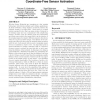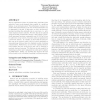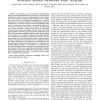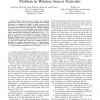309 search results - page 40 / 62 » Compact Wakeup Scheduling in Wireless Sensor Networks |
MOBICOM
2009
ACM
14 years 2 months ago
2009
ACM
Wireless Sensor Networks are emerging as a key sensing technology, with diverse military and civilian applications. In these networks, a large number of sensors perform distribute...
IPSN
2007
Springer
14 years 2 months ago
2007
Springer
The key application scenario of wireless sensor networks is data gathering: sensor nodes transmit data, possibly in a multi-hop fashion, to an information sink. The performance of...
EWSN
2007
Springer
14 years 7 months ago
2007
Springer
While a multithreading approach provides a convenient sensor application developing environment with automatic control flow and stack managment, it is considered to have a larger d...
TON
2010
13 years 6 months ago
2010
—In this paper, we are interested in minimizing the delay and maximizing the lifetime of event-driven wireless sensor networks, for which events occur infrequently. In such syste...
INFOCOM
2012
IEEE
11 years 10 months ago
2012
IEEE
—When a large amount of sensors are randomly deployed into a field, how can we make a sleep/activate schedule for sensors to maximize the lifetime of target coverage in the fie...




